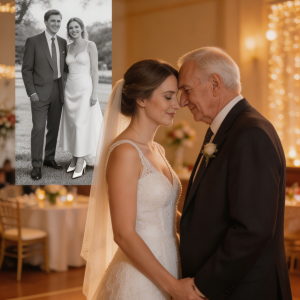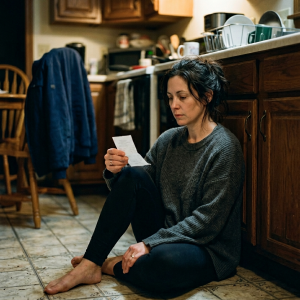Mark clocked out after twelve dusty hours smoothing fresh asphalt, boots aching, palms still warm from the roller’s handle. The sky was turning amber behind the high-rises when he ducked into the drafty train-station café for a cheap, scalding coffee.
Leaning near the exit, he spotted a young woman by the benches. She hugged a blanket-swaddled toddler, her eyes pink as if she’d rubbed away tears all afternoon.
“Hi,” she murmured, voice soft but steady. “I missed my train home. I… I just need enough for a ticket.”
Mark studied her—no hint of the vacant, glassy stare he sometimes saw in panhandlers. Her clothes were mismatched yet tidy; the boy’s cheek rested peacefully on her shoulder.
He thought of the envelope in his jacket: his entire week’s pay cashed out, earmarked for rent and diapers for his own baby girl. An unexpected weight pulled at his chest.
Without quite knowing why, Mark motioned her to the café counter. He bought a turkey sandwich, slid over his untouched coffee, then—after a breath that felt a mile long—handed her the envelope.
“All of it?” she gasped.
“Yeah,” he said, blinking hard. “Get home safe.”
She whispered thanks that sounded more like a prayer, then disappeared through the automatic doors into the November night.
At home, Rachel—his girlfriend—stared as though he’d grown a second head. “You handed a stranger your whole paycheck?”
Mark only shrugged. “Felt like she needed it more than we did.”
They warmed leftover spaghetti, joked to chase off nerves, and fell asleep wondering how far kindness could stretch against overdue bills.
Morning broke with the unfamiliar purr of an engine outside—a sleek white limousine idling at their curb like it had made a wrong turn into the working-class neighborhood.
A man in a charcoal suit approached, leather case in hand, and rapped twice on their peeling front door.
“Mark Davis? You helped someone very dear to us last night,” he announced.
Rachel hissed, “Tell me you’re not in trouble.”
The visitor explained: the woman was Anya Whitmore—daughter of billionaire Alan Whitmore—escaping tabloid chaos after a brutal custody fight.
He pressed the leather case into Mark’s hands. Inside: a handwritten note and a stack of crisp bills—$25,000.
The note read, “To the man who showed my daughter that decency still lives—no strings attached. —A. Whitmore.”
Rachel sank onto the couch, laughing and crying at once. Rent was paid two months forward; the fridge soon brimmed for the first time in ages.
Yet Mark couldn’t forget Anya’s exhausted face. Weeks later, a blocked number lit his phone.
“Mark? It’s Anya. I wanted to say thank-you—really. Could we meet for coffee?”
They met downtown. Anya was rested now—eyes bright, posture lighter—yet her gratitude remained raw and genuine.
Over frothy lattes she shared her plan: her father’s foundation would bankroll a transitional-housing project in Mark’s neighborhood—and it would carry his daughter’s name: The Ava Project.
Mark nearly dropped his cup. “You’re serious?”
Construction began in an old motel two blocks away. On weekends, Mark swung a hammer for free; Rachel filed paperwork and welcomed new tenants.
Opening day, Mark offered a cold soda to a lanky teen hauling belongings for his family—formerly sleeping in their car.
That night Rachel whispered, “Do you see what one good deed started?”
Soon after, Whitmore Holdings invited Mark to co-supervise a downtown development—triple pay, full benefits.
He kept his battered pickup, his thermos coffee, and the habit of noticing people others hurried past.
One evening he spotted a young man on the sidewalk, dog curled in his lap, hunger plain on his face. Mark sat beside him, shared a sandwich, and asked gently, “Tell me what happened.”
Kindness, Mark learned, circles back—sometimes as a limo, sometimes as a city grant, sometimes as nothing more than the quiet certainty that you’ve kept another person afloat.
His story spread quietly—neighbors to friends, parents to children—because people never forget the moment someone truly saw them.
And if you’re holding this newspaper—or scrolling this screen—remember: the smallest mercy can spark miracles. Pass it on.
Like, share, or simply smile at a stranger today. The ripple starts with you.





